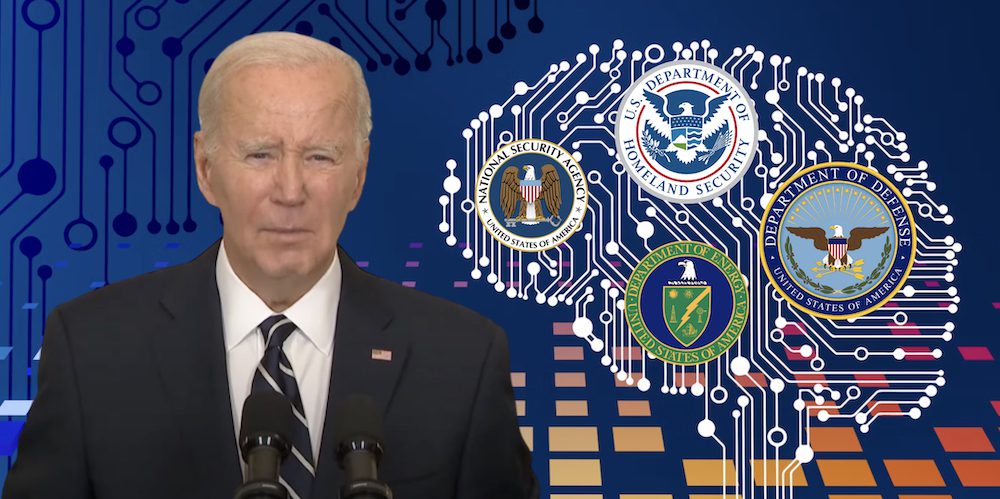Biden’s AI Mandate: Racing Towards a Secure, Intelligent Future or an Orwellian Nightmare?


Biden's AI Mandate: Racing Towards a Secure, Intelligent Future or an Orwellian Nightmare?
Artificial Intelligence (AI), a term that sparks intrigue, skepticism, and even fear in modern society, is about to take center stage in a transformative new way. President Biden’s forthcoming unprescedented executive order mandating, in part, that federal agencies reassess how they can better integrate AI into their operations is yet another shift in the government’s embrace of a technology that while controversial, also boasts considerable potential. This heightened focus on an intelligent and autonomous future is becoming increasingly unavoidable and marks a compelling turning point in the sphere of federal proceedings and by extension, Americans’ day-to-day lives.
The imminent executive order, hinted at through White House invitations to a “Safe, Secure, and Trustworthy Artificial Intelligence” event slated for next Monday, is not an entirely new concept. The spectre of AI’s utilization was previously addressed in 2018 by President Trump’s Executive Order 13960, titled “Promoting the Use of Trustworthy Artificial Intelligence in the Federal Government.” The similarities between the two orders reveal a sustained interest in AI’s prospective advantages but also act as a reminder of the controversial territories such technology can tread upon when applied to governmental infrastructures.
The past few years have already seen notable integrations of AI in various federal sectors. The Department of Education developed a chatbot to streamline financial aid inquiries, lending assistance to over 2.6 million Americans to date. Other departments, like the Treasury, are piloting AI-driven projects aimed at optimizing bureaucratic operations. At times, these technologically advanced procedures can appear slightly Orwellian – the Department of Homeland Security’s AI-equipped “autonomous surveillance towers” operate without human intervention, raising potential privacy concerns.
Even information overload is being tackled by AI deployments. The Central Intelligence Agency (CIA) disclosed its plans to utilize AI to filter through the colossal amount of public information, akin to finding the proverbial needle in a haystack. The AI addition aims to efficiently analyze and extract essential data from the overwhelming amount of open-source intelligence now accessible, ranging from newspapers and cable news to big data and the internet.
Despite the disputes hovering over AI’s application, America looks ready to reap the rewards AI can bring. AI.gov propounds the benefits of incorporating AI into government operations, enumerating areas such as healthcare, transportation, environmental causes, and benefits delivery that stand to gain.
An urgent concern accompanying this sci-fi-esque leap into AI governance is national cybersecurity. The executive order underscores the need for rigorous assessments of advanced AI models to safeguard against potential foreign cyberattacks. While promising to protect Americans from undesired AI ramifications, the Biden administration has also introduced key initiatives to combat AI-related issues, upholding its commitment towards achieving a safe, secure, and trustworthy AI environment.
The adoption of AI by the federal government marks a pivotal moment in the progression towards an intelligently automated future. The forthcoming executive order not only redefines how our federal agencies operate but ushers us towards a new era. As AI becomes an increasingly integral part of our reality, we must grapple with the potential consequences, both positive and negative, while recognizing the transformative power of the technology.
In assessing the role of AI within the government, we stand at an intersection of uncertainty and advancement. Backed by a presidential executive order, the quest to harmonize the robust capabilities of AI with the safety, privacy, and trust of the American people is embarking on a journey unlike any before, taking humanity headlong into an exciting but largely uncharted new world. The effective stewardship of this journey will largely define our era and dictate how we balance ethical governance with technological progression in the years to come. AI presents a paradoxical blend of opportunity and escalation that we, as a society, must now navigate with both enthusiasm and caution.
Recent Posts
Kevin Costner Breaks Silence: ‘Crushing’ Divorce and Moving Forward
"Kevin Costner Breaks Silence: 'Crushing' Divorce and Moving Forward" "Hollywood Icon Kevin Costner Opens Up…
Walgreens Considers Major Store Closures Amid Retail Challenges
Walgreens Boots Alliance CEO Tim Wentworth announced potential closures of a "meaningful percent" of the…
Dave Grohl’s Concert Pause: Foo Fighters Frontman Puts Safety First
Dave Grohl, Foo Fighters frontman, halted a concert in Birmingham to address a crowd disturbance.…
Panthers’ Paradise: Florida’s Stanley Cup Celebration Reaches Legendary Status
The Florida Panthers have etched their names in NHL history not just for their on-ice…
Chanel West Coast’s Double Life: New Reality Show Reveals Star’s Struggles
By day, I'm mom. By night, I'm an artist," Chanel West Coast says in the…
Media Matters Funnels Six-Figure Sum to Board Member’s Firm
Media Matters for America, a nonprofit focused on correcting "conservative misinformation," paid $105,000 in 2022…
